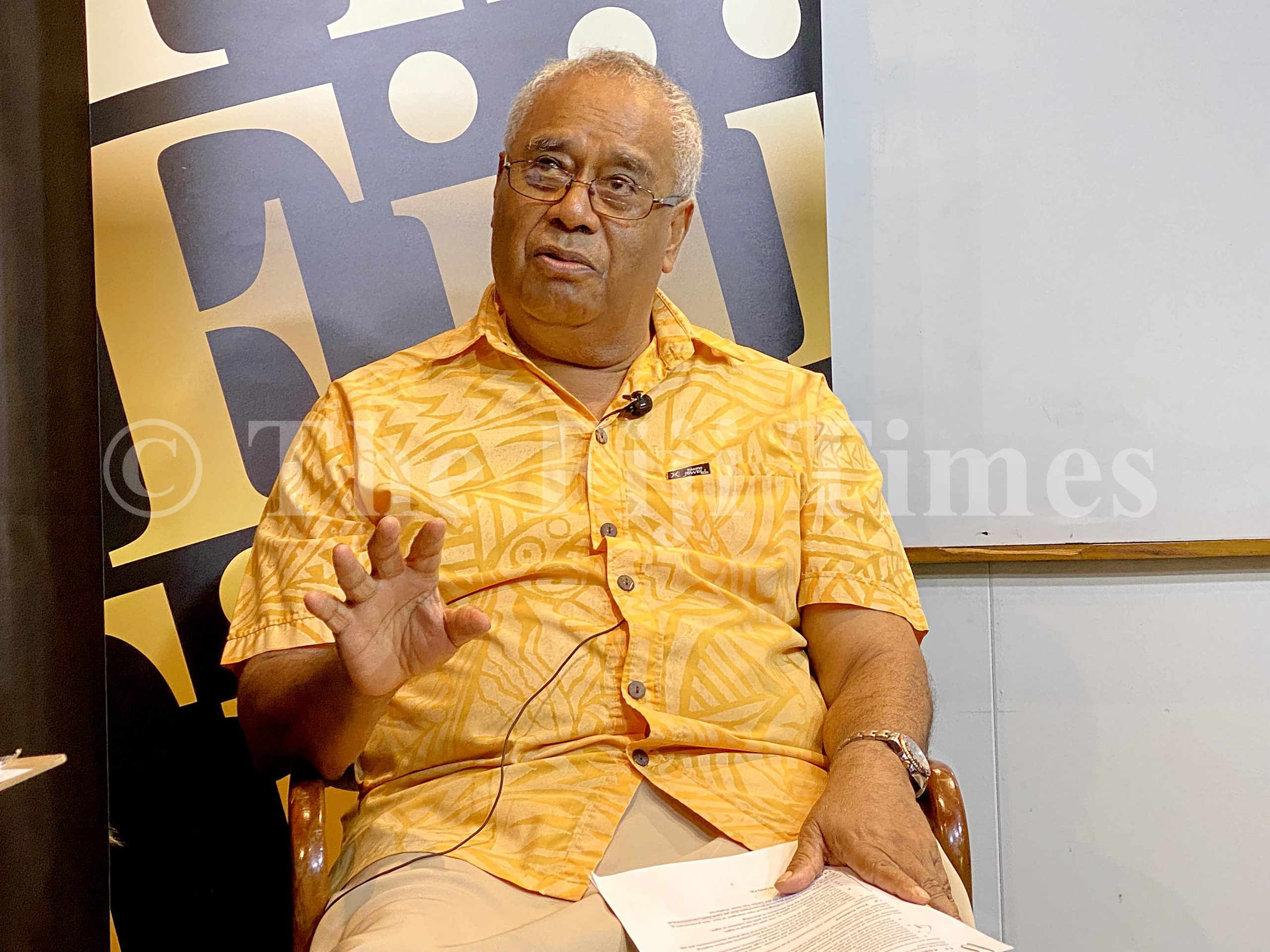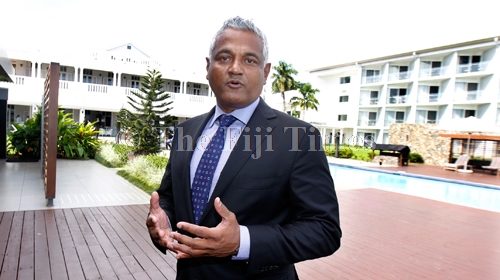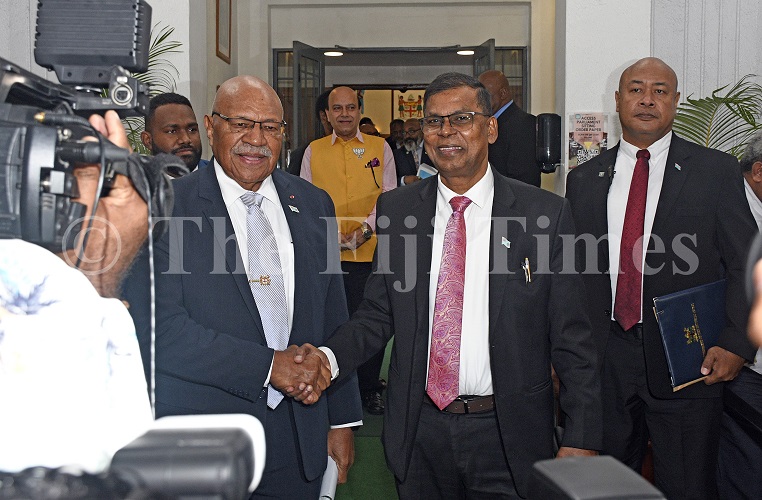Unity Fiji party leader and former Reserve Bank of Fiji governor Savenaca Narube says the 2024-2025 National Budget has failed to inspire confidence needed to bring about sustainability and stability.
Mr Narube said the document was average and uninspiring.
“While there were some good moves like the increase in minimum wages, and good sounding medium-term policies, there were no economic and budget transformations necessary to lift the economy to a higher but stable level, and restore the fiscal balance to a sustainable medium-term position,” he said.
Economic transformation to raise economic growth
Mr Narube said a 5 per cent medium-term average growth rate was achievable.
“The budget mentioned that we must double the medium-term growth rate from 2.5 per cent to 5 per cent.
“This must be our priority which will catalyse the achievement of everything else, including a sustainable debt position.
“A 5 per cent medium-term average growth rate is achievable but business as usual as in this budget will not get us there.”
Mr Narube said while it was encouraging to hear of the new investments in tourism and assistance to the manufacturing sector, Unity Fiji believes that the secret to Fiji’s economic fortunes is to diversify into resource-based sectors.
“Sugar exports are only a quarter of their peak level.
“Cane farmers, especially the landowners, would rather leave their land idle instead of planting sugar cane. The return from sugar cane is far less than other alternative crops.
“For political reasons and like previous governments, this Government is ignoring the challenges of sugar cane farming. Instead, this budget continues to throw more money into the industry through subsidies and higher cane prices.
“Given the many families that still rely on the industry, the Government must muster the courage to design a medium to long-term plan for the sugar industry that is realistic and addresses the challenges that the industry is facing.
“The budget continues to drip feed the other resource-based sectors of non-sugar agriculture, forestry, mining and fisheries.
“The budget allocates subsidies and grants to these sectors which are obviously inadequate to drive these natural resources toward their full potential.”
He said the Government was seriously lacking in transformative and innovative thinking in this important area.
“The solution seems to be to give more money to the ministries rather than to the businesses.”
Fiscal sustainability through reforms
Mr Narube said it was good to hear of the Government’s plan to reduce the debt to GDP ratio to 60 per cent in 2040.
“Sixteen years is a long time. The budget failed to include the fiscal reforms that would shorten the road to a sustainable debt level and give us more fiscal space to work with.
“The first step in this fiscal reform is to bring the budget deficit to below 3 per cent of GDP. The first two budgets of the Coalition Government posted deficits of over 4 per cent.
“The Government should use a budget framework that targets a budget deficit of below 3 per cent and by realistically projecting revenue, the total expenditure falls out.
“In this manner, the reforms must begin with the aim to reduce the size of the central government to 28 per cent of GDP from the current level of 32 per cent.
“This requires very strict prioritisation which is only possible through reforms.”
He said a lot of taxpayers’ money had been wasted through cost overruns of projects.
“Therefore, the Government should strengthen how it manages projects, especially those on infrastructure.
“Building roads should cost us about $3million per kilometer and not $12 million.
“The operating and capital transfers to the State-owned Enterprises (SOEs) like the Fiji Roads Authority and statutory bodies, amount to over $1.8billion, which is 43 per cent of the total expenditure. This is huge.
“We have been concerned for a long time about the value for money of these transfers. Yet, there is no mention in the budget of the reforms of these SOEs. The budget does not mention any measures to increase expenditure efficiency.”
Mr Narube said they had also suggested the development of a new travel policy and an assessment of vehicle leasing against outright purchase.
“Vehicle leasing is estimated at $38million and travel and communication about the same amount.
“The public is demanding changes to these two high profile expenditures, yet no change was included in the budget.”
Social priorities
Unity Fiji commended the Government for elevating housing to a higher priority.
Mr Narube said this was a basic need which had been ignored for a long time.
“However, Unity Fiji thinks that the Government has not highlighted enough the seriousness of drug abuse, especially amongst our children.
“This is a dangerous trend that must be stopped now. The measures announced in the budget, like establishing a Narcotics Bureau, are not enough.
“The emphasis should be on prevention, and we would have liked a concerted partnership between the Government and faith-based organisations, the vanua and the NGOs to attack the root causes of this explosive national issue.
“The growing incidents of corruption at all levels are of extreme concern to the people. It is disappointing that there was no mention of corruption in the budget speech.
“The budget should have included measures to reduce corruption by strengthening the independence of watchdogs like FICAC and the Auditor General, improving laws on the protection of whistleblowers, and allocating more resources to the investigations of allegations of corruption.”
Trust and confidence in the Government
Mr Narube said it was very interesting that the Finance Minister opened his budget speech on the need to increase the trust of the people in the Government.
He said this trust extended well beyond the budget credibility.
“The trust and confidence in the Government have been dashed by the recent political developments, including the lack of discipline against the two ministers in the Melbourne scandal, the recent increase in the salary of the parliamentarians, and the disregard of their promises in the 2022 campaign.
“We must thank the Minister for Finance for valiantly trying to defend the pay increases of parliamentarians.
“He has assured us that the process will be made independent in future. This is cold comfort to the people. It begs the question of why this central issue of independence did not cross their minds when they approved the rise in salaries in the first place.”
Mr Narube said like FijiFirst, the Coalition Government was making the same serious mistake of taking the people for granted.
“The Minister for Finance said that the cost of the rise in salaries was only half of the amount quoted publicly by the Prime Minister of $8.1million per year.
“This difference hurts the credibility of the PM, and the Minister for Finance should clarify how the PM was given a higher amount.
“This and other confusing statements from the Government on the entire saga adds to the belief that the Government did not fully understand the processes. It was focused more on the money, and the coordination was seriously flawed.”





